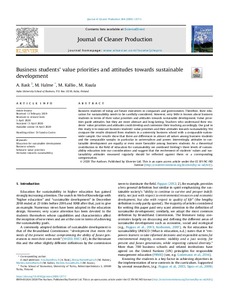Business students' value priorities and attitudes towards sustainable development
Bask A; Kallio M; Halme M; Kuula M
Business students' value priorities and attitudes towards sustainable development
Bask A
Kallio M
Halme M
Kuula M
Elsevier
Julkaisun pysyvä osoite on:
https://urn.fi/URN:NBN:fi-fe2021042827031
https://urn.fi/URN:NBN:fi-fe2021042827031
Tiivistelmä
Business students of today are future executives in companies and governments. Therefore, their education for sustainability needs to be carefully considered. However, very little is known about business students in terms of their value priorities and attitudes towards sustainable development. Value priorities guide attitudes, but they are more abstract and long-lasting. Teachers who understand their students' value priorities and attitudes could develop and customize their teaching accordingly. Our goal in this study is to measure business students' value priorities and their attitudes towards sustainability. We compare the results obtained from students in a university business school with a comparable nationwide sample. Our results show that there are differences in almost all values among business students and the comparable sample, in particular in universalism and power. Interestingly, attitudes to sustainable development are equally or even more favorable among business students. As a theoretical contribution in the field of education for sustainability we combined Sterling's three levels of sustainability education into our considerations and suggest that the evolvement of students' values and sustainability attitudes measured regularly should be reflected against them or a corresponding categorization. (C) 2020 The Authors. Published by Elsevier Ltd.
Kokoelmat
- Rinnakkaistallenteet [19207]
